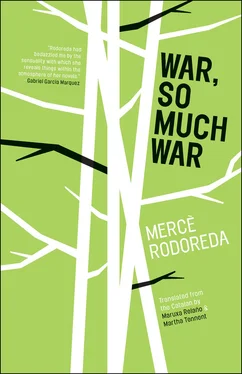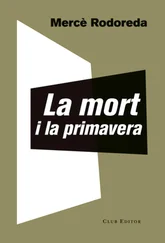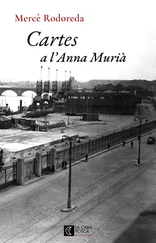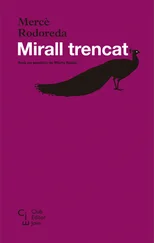I awoke at daybreak. I was lying by a hayloft. A hen was pecking at my feet. A rooster crowed. I ran a hand over my head, bald in patches, unshorn in others. I would have stayed there and slept forever, buried in the hay. But I had to leave. I was sore, everything ached. I stood up and started walking, though not without first turning around to bid farewell to the farmhouse where the wedding party had taken place. From a ground floor window the moon-shaped man, his face as red as a partridge, craned his neck forward as he looked at me and blew his nose between two fingers.
XXXI MATILDA’S WHITE BELLY
I TRIED LOOKING AT THE SUN, THE WAY THE HERMIT DID, TO SEE if it would burn my pupils. This game of mine was interrupted by the racket of a motorcycle that came to a sudden halt in front of me. The man on the motorcycle said, if you want me to take you somewhere don’t hesitate to ask, I’m not going anywhere. His mouth warped into a grimace of disgust. He had long teeth, his canines much like a dog’s, and restless eyes that darted around without focusing on anything. Can’t make up your mind? He removed a pack of cigarettes from his jacket pocket and held it out to me as he said, someone really worked you over, son. He stuck the cigarettes under my nose, determined that I take one; I had to confess I had never smoked before, other than some herbs behind my mother’s back when I was little and trying to act like a man. Smoke! The first drag made me cough. My eyes watered. The motorcycle man said he liked to smoke fast so he could get to the end of the cigarette and light another one. The best part is when you light up. That’s why men who have lost their eyesight don’t smoke. . when I tire of smoking I’ll fix this mess of a haircut you’ve got. Who the hell did that to you? I liked him because his eyes darted from the branches to me, from the road to the grass, from the tip of his cigarette to the tip of mine, which was turning to ash.
He began his story by saying that he had once had a brig inside a bottle and that it was his father’s fault that he had chosen to become a barber: When he was small, his father would have him cut the hair on the back of his neck because he couldn’t reach there. Then I was hired as an apprentice to the barber two doors down, a sad, bald man who had a liver condition and subsisted on a diet of boiled rice. He died when I finished my military service and I took over the barbershop. All the clients knew me, and they continued to come. I had two shop windows, one facing the main street and the other an alleyway. They were lined with empty bottles labelled quinine and tar, and a giant bottle that had once held cologne and that I filled with water. On the corner in front of the barbershop was a bakery. When my boss died, the baker followed suit. Two months later, a flower shop opened where the bakery had been. It took me a while to notice the owner. Then, one Saint Magdalene’s Day, tired of hearing my Magdalena whine that I never brought her any gifts, I went in to buy her a rose. She was a manicurist, Magdalena. She came to the house on Sundays; we’d sleep together for a while and then we’d clean the place. Magdalena was a quiet girl from a modest but decent family.
The owner of the flower shop wrapped the rose in tinfoil and spritzed it with water. Her eyes changed colors and her skin was silkier than the plush petals of the rose she had just sold me. From that day on I started spying on her from behind the giant bottle. She had the appearance of a little girl with sword-like legs. She always wore a black skirt and a white blouse. Until finally I could contain myself no longer and I strode into the shop to buy a begonia that I would put — I told her — in the main shop window. You’ll need to water it often. With the begonia as an excuse, I would stop in to see her every now and then. The leaves are falling off. I don’t think I’m watering it enough. Her name was Matilda. I fell in love with her. I left Magdalena.
I didn’t want Matilda to work. I wanted her all to myself. Sell the flower shop. But no, there she was, as always, with her boxes of flowers and the atomizer she used to spritz them. I won’t recount the wedding night, I’ll only say she was still wearing her black skirt and white blouse when she got in bed. I unzipped her. She had nothing on underneath. I’d never seen a belly as white as hers. It took my breath away. And every night I worshiped it. I never tired of looking at it. I abandoned my friends, I stopped playing billiards. There weren’t enough nights, not enough Sunday afternoons or holidays to worship and worship and worship her belly. I lost clients. I never stopped asking her to give up her shop. It was a silent war. Sell the store, sell the store. But she wouldn’t budge. Until, disappointed and defeated, I learned to keep quiet. One evening, about three months after I had stopped talking to her, she remained standing on the other side of the table after serving me dinner, eyes downcast, and then she suddenly lifted her skirt and stood there with her belly exposed. I continued to eat as if nothing had happened, as if she were in the kitchen preparing something. And from that evening on, every night at dinnertime she would do the same: skirt up and belly showing. I stopped having supper at home. I stopped having lunch at home. I went to the bar, I played billiards, I returned home at dawn. She never relented. She would show me her belly when I climbed into bed, when I came out from washing, as soon as I opened my eyes. I grew sick of her. And then, fortunately, the war started. I enlisted at once. And now I serve as liaison, or at least I did. I deserted, left my battalion. I think I might open a barbershop in France. Want to come with me? I told him I preferred to be on my own so I could consider things slowly, methodically. Clicking his tongue, he strode to his motorcycle and from the haversack hanging on the back brought out a clipper and a razor. He left my head looking like a ball and my face fuzz-free. He departed enveloped by a cloud of dust. When the dust settled I saw a strange man coming toward me.
XXXIITHE MAN WHO WALKED WITH HIS BACK TO THE SUN AND THE MOON
HE WAS IN HIS MIDDLE YEARS. HIS BLACK BEARD CAME DOWN TO his chest and his grey hair reached the middle of his back. He was bare-chested beneath a jacket with moth-eaten lapels. The legs of his trousers had rips of considerable size, one around the knee, the other at thigh-level. He wore new sandals. A rusty key hung from a string around his neck. His eyes sparkled as though made of silver, and his lips were barely visible beneath the tangled hairs of his mustache. A blackbird was perched on his shoulder. He stopped in front of me, stood there for a while, and then asked me if I knew the name of the nearest village. It occurred to me that he was in a jesting mood, but what he really wanted, like most people, was someone to talk to. Someone to lend him an ear. The blackbird squawked. Stop being a nuisance. The sun, he said, is retiring and there will be no shadows. When the moon is out I shall be on my way. My grandmother was very old when she died, but dead and dressed in her Sunday best she had all the freshness of flowers; it was as though she had fallen asleep after coming home from Mass. She taught me to love my shadow. She said: You and your shadow were placed in the saddle of life so that you might gallop together. I have no one in this world, nor do I wish to; I want to live alone with my shadow. I was little then. Haven’t you noticed that you have a shadow? I didn’t move and the shadow didn’t move. It was I who cast that dark smudge on the ground. I make the shadow. I am it. No. It is you. Without it — and she pressed a finger against my forehead — you would not be. If you lose it, you die. Whenever I found myself alone I stood in front of the lamp and slowly lifted an arm, and so did the shadow. I extended the other arm, so did the shadow. I was little. I tilted my head, it did the same. Everything I did, it did as well.
Читать дальше












